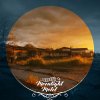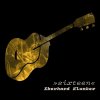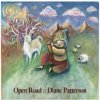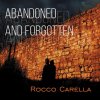

 Azalea "Gypsy's Moonlight Motel" 2018
Azalea's super power is their vocals - Mia's honey sweet soprano and Benjamin's warm tenor blend perfectly on original songs brimming with hope and love. Their appealing mystical-Americana-meets-pop sound is layered
with lots of dynamics from strummed acoustic guitar, percussion, keyboard and more that can swell to a crescendo and then fall to a near whisper, all in one song. It's even more remarkable when you know that they played
all the instruments. "I See the Church" uses vivid images to offer a spiritual message. They sing of perfect love in "Desert Moon." "Reflections" features a sparkling mandolin against a gentle piano. "Moon's White Light"
is a compelling track that starts with big rock chords and wailing vocals that quickly falls to a calmer feel, then crescendos again and again.
©
Jamie Anderson
Azalea "Gypsy's Moonlight Motel" 2018
Azalea's super power is their vocals - Mia's honey sweet soprano and Benjamin's warm tenor blend perfectly on original songs brimming with hope and love. Their appealing mystical-Americana-meets-pop sound is layered
with lots of dynamics from strummed acoustic guitar, percussion, keyboard and more that can swell to a crescendo and then fall to a near whisper, all in one song. It's even more remarkable when you know that they played
all the instruments. "I See the Church" uses vivid images to offer a spiritual message. They sing of perfect love in "Desert Moon." "Reflections" features a sparkling mandolin against a gentle piano. "Moon's White Light"
is a compelling track that starts with big rock chords and wailing vocals that quickly falls to a calmer feel, then crescendos again and again.
©
Jamie Anderson
 Damien Aribert "Destinations" 2014
Damien Aribert is a French guitarist, composer, and teacher. His disc Destinations comes in three parts: The first 5 tracks are classical, with some traditional favorites like "Asturias" by Isaac Albeniz
and "Danza del molinero" by Manuel De Falla. He handles these pieces with clarity and obvious knowledge. I enjoyed his "Asturias" very much, giving it the driving force the beginning and end demand, and power
in the chordal sections without losing his rhythm, which seems all too present for players with lesser skills, while exuding sweetness in the slower middle section. He performs a dellicate version of "Ave Maria"
using tremolo on the treble strings while alternating bass with his thumb. It works very well. The middle four tracks are a "Suite for Lovers" by Maria Linnemann, a lovely melodic piece that reflects both joy and
melancholy, the hope and longing of love (you can find Aribert play this on YouTube). The final 5 tracks are a mix of pieces, some classical like Koshkin's "Parade." There are two original pieces by Aribert,
"Eclipse a Rio," which sounds like it could have been written by Antonio Carlos Jobim, and "Can U feel the groove?," where Aribert lets his funky side show, with bluesy slapping. All in all this is an enjoyable
CD covering a range of styles on classical guitar, played well by Damien Aribert.
©
Kirk Albrecht
Damien Aribert "Destinations" 2014
Damien Aribert is a French guitarist, composer, and teacher. His disc Destinations comes in three parts: The first 5 tracks are classical, with some traditional favorites like "Asturias" by Isaac Albeniz
and "Danza del molinero" by Manuel De Falla. He handles these pieces with clarity and obvious knowledge. I enjoyed his "Asturias" very much, giving it the driving force the beginning and end demand, and power
in the chordal sections without losing his rhythm, which seems all too present for players with lesser skills, while exuding sweetness in the slower middle section. He performs a dellicate version of "Ave Maria"
using tremolo on the treble strings while alternating bass with his thumb. It works very well. The middle four tracks are a "Suite for Lovers" by Maria Linnemann, a lovely melodic piece that reflects both joy and
melancholy, the hope and longing of love (you can find Aribert play this on YouTube). The final 5 tracks are a mix of pieces, some classical like Koshkin's "Parade." There are two original pieces by Aribert,
"Eclipse a Rio," which sounds like it could have been written by Antonio Carlos Jobim, and "Can U feel the groove?," where Aribert lets his funky side show, with bluesy slapping. All in all this is an enjoyable
CD covering a range of styles on classical guitar, played well by Damien Aribert.
©
Kirk Albrecht
 Eberhard Klunker "Sixteen" 2017
Eberhard Klunker's Sixteen, is a gorgeous collection of solo acoustic guitar improvisations. Growing up in the mountain village of Herzberg, Germany, Klunker is primarily self-taught; however, he has an
innate musicality that makes this album both assessable and noteworthy. Sixteen begins with the dramatic title track set in a minor key, where the artist establishes a guiding theme or main motif and then
freely improvises within the parameters of composition. He employs lush harmonics, sparse percussive embellishments, while eloquently weaving between diatonic and pentatonic single note flurries. "Minor Third
Waltz" is entirely improvised centered around pronounced blues riffing culminating with brilliantly conceived two-handed tapping sequences. The album finishes with the seemingly introspective "Where Are You
Now," that begins with pensive chordal passages that segue into a groove oriented section reminiscent to Miles Davis's "It's About That Time" from the ephemeral "In a Silent Way" release. All of the pieces on
Klunker's offering are brilliantly recorded, without studio effects to capture the natural sonic intricacies of the instrument. Sixteen is a thoroughly listenable recording and is highly recommended for
all fans of acoustic guitar music.
©
James Scott
Eberhard Klunker "Sixteen" 2017
Eberhard Klunker's Sixteen, is a gorgeous collection of solo acoustic guitar improvisations. Growing up in the mountain village of Herzberg, Germany, Klunker is primarily self-taught; however, he has an
innate musicality that makes this album both assessable and noteworthy. Sixteen begins with the dramatic title track set in a minor key, where the artist establishes a guiding theme or main motif and then
freely improvises within the parameters of composition. He employs lush harmonics, sparse percussive embellishments, while eloquently weaving between diatonic and pentatonic single note flurries. "Minor Third
Waltz" is entirely improvised centered around pronounced blues riffing culminating with brilliantly conceived two-handed tapping sequences. The album finishes with the seemingly introspective "Where Are You
Now," that begins with pensive chordal passages that segue into a groove oriented section reminiscent to Miles Davis's "It's About That Time" from the ephemeral "In a Silent Way" release. All of the pieces on
Klunker's offering are brilliantly recorded, without studio effects to capture the natural sonic intricacies of the instrument. Sixteen is a thoroughly listenable recording and is highly recommended for
all fans of acoustic guitar music.
©
James Scott
 Diane Patterson "Open Road" 2018
In "Eagle Feather" this powerful singer-songwriter sings of a peaceful warrior; it could easily be a song about her. From "Rogue River Highway," where she honors refugees, to "Resolved," a prayer of healing,
she offers grounded observations of a diverse planet. "Shape of Your Sorrow" is an especially poignant song. Written after the Pulse shooting in Orlando, she asks "Where were you when loneliness and shame took
a young man's heart?" A brooding minor guitar part underscores the melancholy. Recorded at Ani DiFranco's studio, many of the songs are reminiscent of her later work with upbeat world beat arrangements.
©
Jamie Anderson
Diane Patterson "Open Road" 2018
In "Eagle Feather" this powerful singer-songwriter sings of a peaceful warrior; it could easily be a song about her. From "Rogue River Highway," where she honors refugees, to "Resolved," a prayer of healing,
she offers grounded observations of a diverse planet. "Shape of Your Sorrow" is an especially poignant song. Written after the Pulse shooting in Orlando, she asks "Where were you when loneliness and shame took
a young man's heart?" A brooding minor guitar part underscores the melancholy. Recorded at Ani DiFranco's studio, many of the songs are reminiscent of her later work with upbeat world beat arrangements.
©
Jamie Anderson
 Neck Bros. "Stomp" 2017
The explosively expressive performances and adventurous compositions of Stomp, the second CD release from the Neck Bros., are engaging and addictive. French guitarists Arnaud Leprêtre and François Hubrecht,
adopt a "take no prisoners" musical sensibility as they bring the tempo up a few notches from their 2014 debut release, "Coude à Coude"("Elbow to Elbow"). Trading licks, riffs, arpeggios, melody and rhythm,
their guitars converge and intertwine in the pulsating ebb and flow of ten original and tasty tunes. Hubrecht 's percussive rhythm opens the door wide on "Bros Therapy," followed by Leprêtre's tantalizing
lead ascending and carrying the melody and listener on a sweeping sonic ride filled with energy and six string charisma. "String Connection" and "Neck Bros Stomp" offer more of the same while "L'absence"
and "Un Autre Jour" trade the frenetic for a gentle, sweeter tempo. Stomp is filled with irrepressible sonic passion throughout.
©
James Filkins
Neck Bros. "Stomp" 2017
The explosively expressive performances and adventurous compositions of Stomp, the second CD release from the Neck Bros., are engaging and addictive. French guitarists Arnaud Leprêtre and François Hubrecht,
adopt a "take no prisoners" musical sensibility as they bring the tempo up a few notches from their 2014 debut release, "Coude à Coude"("Elbow to Elbow"). Trading licks, riffs, arpeggios, melody and rhythm,
their guitars converge and intertwine in the pulsating ebb and flow of ten original and tasty tunes. Hubrecht 's percussive rhythm opens the door wide on "Bros Therapy," followed by Leprêtre's tantalizing
lead ascending and carrying the melody and listener on a sweeping sonic ride filled with energy and six string charisma. "String Connection" and "Neck Bros Stomp" offer more of the same while "L'absence"
and "Un Autre Jour" trade the frenetic for a gentle, sweeter tempo. Stomp is filled with irrepressible sonic passion throughout.
©
James Filkins
 Rocco Carella "Abandoned and Forgotten" 2016
Italian Rocco Carella plays jazz, fusion, and classical music and has released several solo recordings to date. Abandoned and Forgotten primarily features solo nylon string guitar. Carella overdubs guitars
on several tracks and includes Roberta Ardito on violas on another. I find his solo performances the best developed and most interesting. Among these is the opener, "La via Lungo il Mare," which features bold
dissonances in the guitar's middle register followed by octave and contrapuntal lines. Having established a sense of drama, Carella continues with Gigli and Modungo's 1964 pop tune, "Tu Si' Na Cosa Grande."
Another original, "Abandoned Lands," has a calming effect and provides a good transition to two jazzy tunes, "Victor Young's "Stella By Starlight" and Carella's own "Thanks Wes." Several other pieces are more
classically-influenced, "Um Dia de Chuvisco," "Biancospino," and "The Maghreb Girl" among them. Carella's engaging solo arrangement of Michael Jackson's "Man in the Mirror" fits perfectly into this stylistic
mix, as does Samule Bersani's "Guidizi Universali." "The Sunset Ballad," composed by Carella, spans classical, jazz, and pop, and is a beautiful closing track. Here's hoping that this release will earn Rocco
Carella wider recognition as a composer and guitarist.
©
Patrick Ragains
Rocco Carella "Abandoned and Forgotten" 2016
Italian Rocco Carella plays jazz, fusion, and classical music and has released several solo recordings to date. Abandoned and Forgotten primarily features solo nylon string guitar. Carella overdubs guitars
on several tracks and includes Roberta Ardito on violas on another. I find his solo performances the best developed and most interesting. Among these is the opener, "La via Lungo il Mare," which features bold
dissonances in the guitar's middle register followed by octave and contrapuntal lines. Having established a sense of drama, Carella continues with Gigli and Modungo's 1964 pop tune, "Tu Si' Na Cosa Grande."
Another original, "Abandoned Lands," has a calming effect and provides a good transition to two jazzy tunes, "Victor Young's "Stella By Starlight" and Carella's own "Thanks Wes." Several other pieces are more
classically-influenced, "Um Dia de Chuvisco," "Biancospino," and "The Maghreb Girl" among them. Carella's engaging solo arrangement of Michael Jackson's "Man in the Mirror" fits perfectly into this stylistic
mix, as does Samule Bersani's "Guidizi Universali." "The Sunset Ballad," composed by Carella, spans classical, jazz, and pop, and is a beautiful closing track. Here's hoping that this release will earn Rocco
Carella wider recognition as a composer and guitarist.
©
Patrick Ragains
